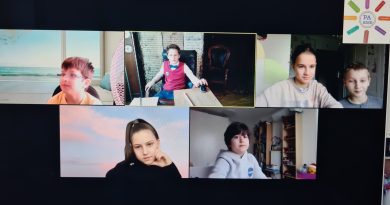Why Drama?
At the start of the school year, many parents in MYP1-3 were curious about why a full year of Drama had been added to the schedule. While it is true that I just enjoy teaching it, there are many reasons why we decided to include it in our timetable.
First of all, Drama is one of the Arts courses suggested by the MYP. As an MYP school, we have a responsibility to offer as many of these as we can. In a larger school environment, students would be able to choose which Arts course they wanted to take in MYP 4-5, after “sampling” several of them in MYP 1-3. While we can’t do that just yet, it is one of our goals.
Drama is a great creative outlet, but it doesn’t necessarily depend on things like eye-hand coordination or artistic talent. (I can’t draw a straight line with a ruler; ask the kids!) At its core, it is based on something every child has done at some point or other: make-believe. It is a chance to play around and be a little silly; students even have permission to take their shoes and sit on the floor if they like. For many students, this is a completely different academic experience.
Even with all of that, the question Drama teachers hear most often is, “But what good is it? My kid isn’t going to be an actor.” What many people don’t realize is how so many of the skills we practice in Drama can transfer into other classes and even other areas of life. Drama students need to collaborate and problem-solve. They learn to work with everyone and deal with being responsible to others; if they don’t learn their lines or bring their props, the whole groups suffers. They practice techniques to help calm their nerves and not feel embarrassed in front of a crowd. They learn to make eye contact, project their voices, and speak like they know what they are talking about.
Our current unit is Mime. Every time I mention it, half the class is suddenly trapped in an imaginary box or stuck behind an imaginary wall. That is not the kind of mime we’re doing, however. (The students know that I actually find those kids of mimes creepy.) This is about storytelling using only body language and facial expressions: no words, no props, no sound effects. Are you curious to see some of what we’re doing? Click on the link to download our “coursebook” for the unit.
I started this blog before we went online; needless to say, my lesson plans have changed. Many of the games I use are useless when we can’t all be in the same room, and it’s difficult to talk about acting with your whole body when nobody can see your feet. The good news is, this is Drama. We know how to improvise.




